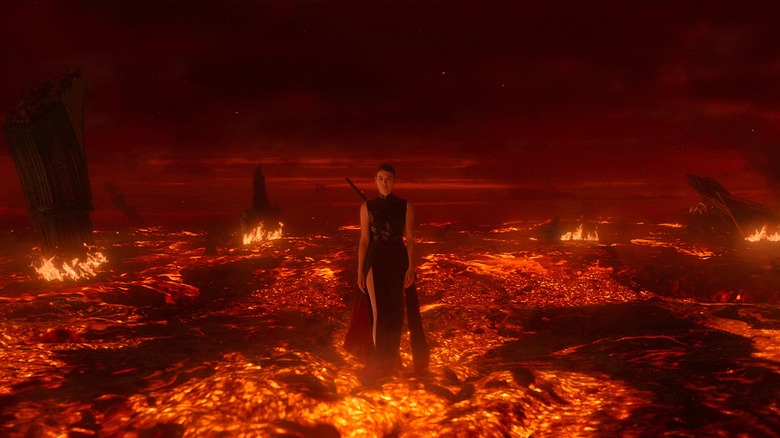3 Body Problem Review: One Of The Greatest Sci-Fi Novels Gets The Brazenly Nerdy Adaptation It Deserves
It's 1966 Beijing, the beginning of China's tumultuous Cultural Revolution, and a handful of revolutionary soldiers are staging a so-called "struggle session." Intellectuals and scientists are paraded before a frenzied crowd, mocked and humiliated for espousing worldviews contrary to the anti-authority ideals of their violent cause. When one astrophysics professor in particular calmly pushes back against the mob to defend his prior teachings on Einstein's theory of relativity, the Big Bang, and other fundamental truths of the universe, nobody knows that the bloody consequences that follow will eventually inspire the single most significant act in humanity's existence — one tiny ripple that would reverberate through the infinitely large pool of space and time for the rest of recorded history.
This harrowing sequence that opens Netflix's "3 Body Problem" is lifted almost word-for-word from the first chapter of Chinese author Liu Cixin's popular 2006 novel "The Three-Body Problem," part of a trilogy called "Remembrance of Earth's Past," in an early indication that fans of the Hugo Award-winning source material and newcomers alike are truly in safe hands ... yes, even as the present-day characters have undergone wholesale changes from the books. For a series with as much cosmic ambition as this one, such an overtly grounded and political tone-setter (censored heavily in China's own overly-literal interpretation of the same book, released last year in thirty episodes under the title "Three-Body") may feel like an unexpected start. It's much less surprising, however, that this would so clearly appeal to the creators of "Game of Thrones."
"3 Body Problem" will inevitably draw comparisons to the HBO smash-hit (especially the superb early seasons), as much for its lofty budget and scale as for its attempt to accomplish for hard sci-fi what "Game of Thrones" did for high fantasy. And, indeed, where the latter managed to turn everything from incestuous royal bloodlines to fire-breathing dragons into topics of everyday conversation, the former casually tosses out concepts like string theory and the Fermi Paradox or terms like "syzygy" and "human abacus" with the enthusiasm of a smooth-talking professor on their first day of class. By the end of its first semester season, in which all eight episodes were screened for critics ahead of time, "3 Body Problem" firmly establishes itself as the most unabashedly nerdy example of mainstream media we've seen since Jon Snow saved the Seven Kingdoms — and quite likely the most visceral and entertaining, too.
Whatever feelings spring to mind upon reading the names David Benioff and D.B. Weiss, leave any negative preconceptions at the door. What they and fellow co-showrunner Alexander Woo have accomplished here is nothing short of miraculous. This isn't the next "Game of Thrones," but something much more thrilling than that. "3 Body Problem" sets a new standard for what sci-fi is capable of.
A faithful adaptation, but an even better show
"All the physics of the last 60 years is wrong. Science is broken," a despondent physics prodigy laments early on in the present-day storyline. For a show that could've collapsed underneath the weight of all the existential ideas and capital-letter Themes on its mind, "3 Body Problem" takes a fairly straightforward path to kick the plot in motion. A rash of suicides within the scientific community have taken place within an alarmingly short period of time, perhaps connected to research and experiments gone haywire that have confounded the best and brightest minds. In short, this genre-bender begins with the most classic one of all: a murder mystery.
Gently coaxing viewers into the action before things take a turn for the surreal is a deceptively clever adaptation choice, as is the presence of our main quintet of characters nicknamed the Oxford Five. In the most controversial, yet effective change made to the material, none of them are exact representations of the various characters from the book. Instead, the writers compress the centuries-spanning timeline of "The Three-Body Problem" and its following two sequels, streamlining the actions, personalities, and narrative functions of multiple protagonists (many of whom never even meet one another) into a group of close-knit friends we can follow throughout season 1 and beyond. Of the five, "Game of Thrones" alum John Bradley makes a big impression playing against type as cocky millionaire Jack Rooney, along with standouts Jess Hong as Jin Cheng and Eiza González as Auggie Salazar. (For both Jovan Adepo as Saul Durand and Alex Sharp as Will Downing, their best material comes later in the season.) By avoiding a direct 1:1 translation of the book(s), "3 Body Problem" acknowledges what were deeply insular stories that thrived on interiority in their written form and shifts things outward among its ensemble cast, providing a much more natural flow of information, reveals, and character development — all tailored for a visual medium.
The final result is a genuine feat of adaptation, raising the bar sky-high for how to embrace the spirit of the source material without staying rigidly attached to it. But much more importantly, "3 Body Problem" fully understands how to use the medium of television to tell the best possible story it can. In short, it's a breath of fresh air in a streaming era suffocated by so many shows that seem embarrassed to be shows.
Big questions, big ideas, and big swings
True to its name, "3 Body Problem" juggles a trio of major storylines at once. The first revolves around the mysterious deaths of scientists that put lead investigator Clarence Shi (a thoroughly fun and roguish Benedict Wong, finally able to speak on-screen in his natural Manchester accent) and his powerful benefactor Thomas Wade (another "Game of Thrones" veteran, Liam Cunningham) on the trail of villains both otherworldly and frighteningly human. The second forces viewers to mull over why one individual (Ye Wenjie, played by Zine Tseng in flashbacks and Rosalind Chao in the present) would put the fate of untold billions in their hands and make a choice that alters the trajectory of the human race forever. And then there's the most philosophical of them all, centering squarely on the physics problem that gives the series its title and hints at downright extraterrestrial concerns.
It's to the creative team's credit that all three variables of this equation combine to deliver something even greater than the sum of its technical parts. The rotation of directors includes Derek Tsang, Minkie Spiro, Jeremy Podeswa, and Andrew Stanton, and all four consistently elevate the on-screen images. Inspired shot framing and blocking, lighting motivated by the emotions of characters, and purposeful editing techniques fill in the gaps to subliminally communicate what most shows would've relegated to hacky exposition. Even its use of LED-screen filming (commonly referred to as The Volume) deserves praise, taking full advantage of the technology's inherent artificiality and putting it to incredible effect in the virtual-reality sequences that play a significant role in the story. It's here that the Netflix adaptation embraces its geeky ambitions to the fullest, bringing to life some of the most jaw-dropping visuals ever rendered in live-action.
All of this allows "3 Body Problem" plenty of room to dive headfirst into hard sci-fi concepts about our place in the universe and incredibly highbrow attention to detail, without ever making it feel like homework. For viewers whose eyes (understandably) glaze over at the idea of reliving Physics 101, rest assured that there's just as much spectacle as science to be found here. A late-season episode pulls off arguably the most disturbing and well-executed set piece since the infamous Red Wedding from "Game of Thrones," while the show's overall knack for combining philosophy, commentary, and entertainment brings to mind efforts like "Contact" and "The Martian" before it ... even adding a dash of the post-apocalyptic musings and dry sense of humor from "The Leftovers," for good measure.
But at its best, "3 Body Problem" forges its own identity altogether as a thoughtful, existential, and frequently thrilling drama. If certain bits of characterization are painted with a broad brush or the final few episodes drag on beyond the season's obvious endpoint, it's a small price to pay for the sheer boldness and creativity on display. Luckily, none of this prevents these eight episodes from becoming one of the most interesting, well-written, and brilliantly adapted debut seasons in quite some time.
/Film Rating: 8 out of 10
"3 Body Problem" premieres March 21, 2024 on Netflix.


